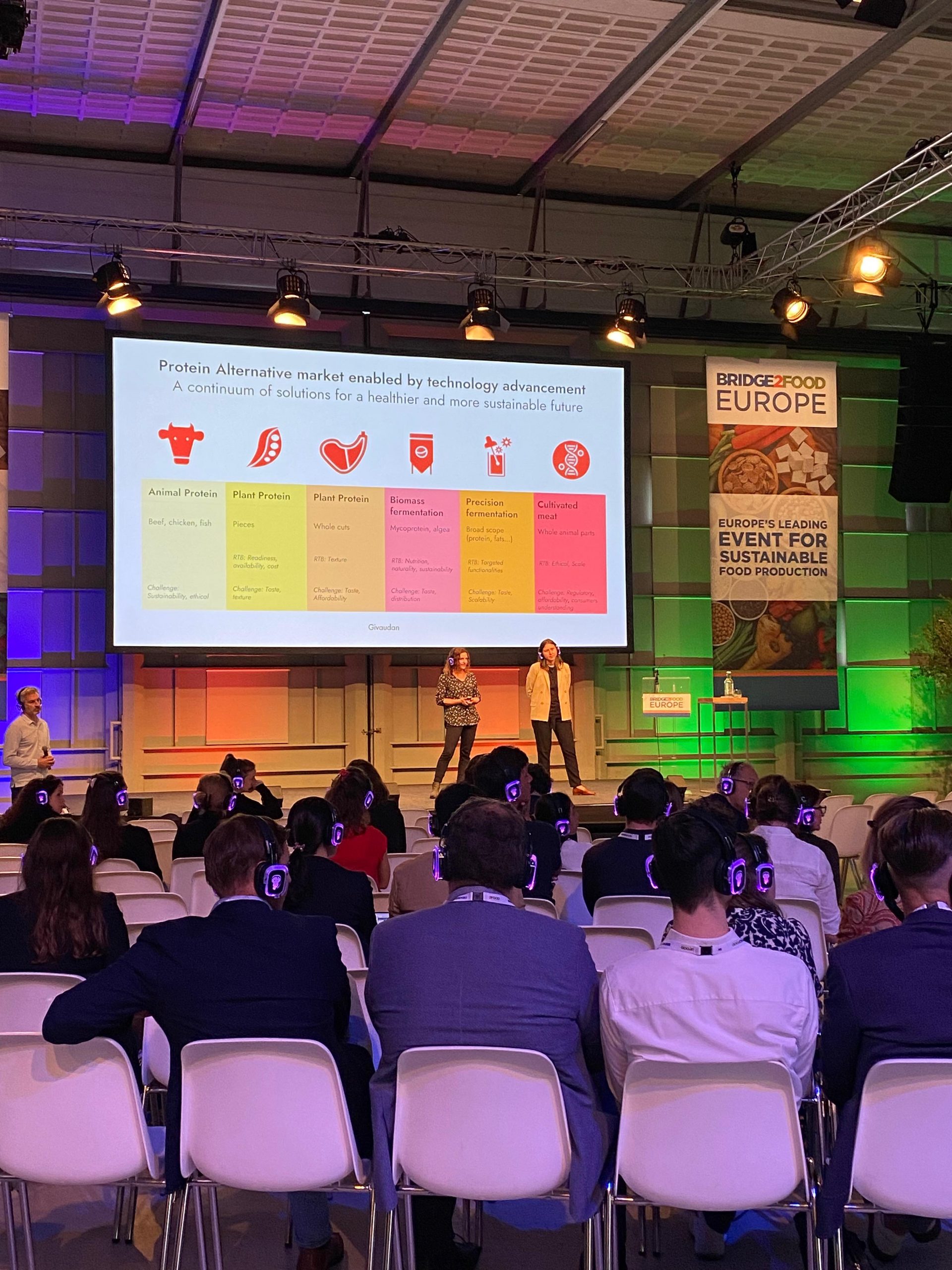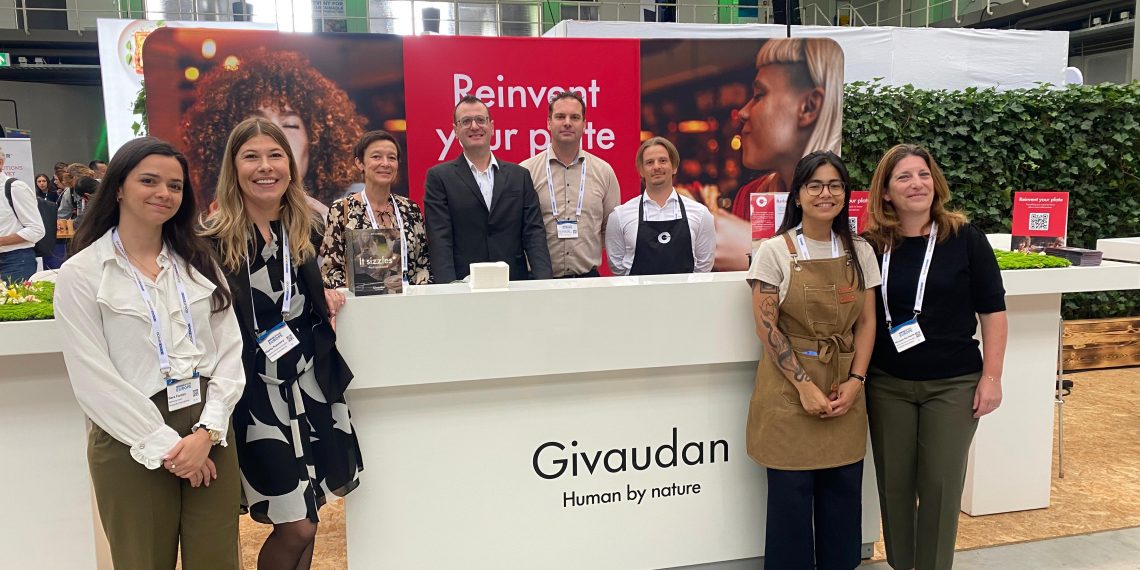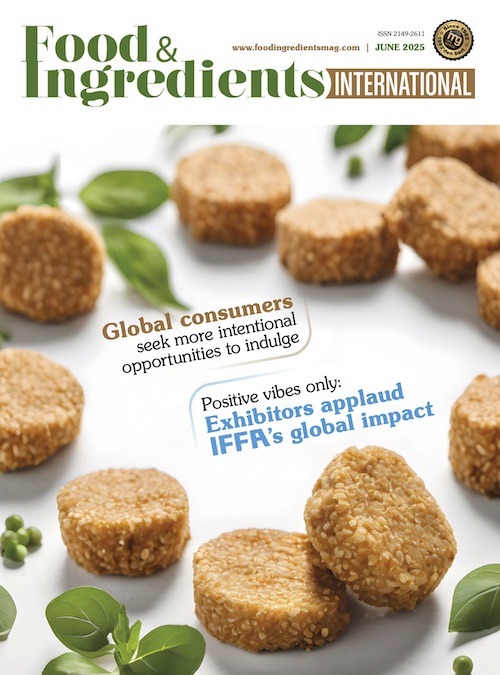After years of strong momentum, the alternative meat category is facing a reality check. According to Nielsen, plant-based meat sales in Europe declined by 3.4% in volume in 2023 compared to 20221. Yet interest persists—Innova Market Insights reports that one-quarter of European shoppers still buy meat alternatives on a typical grocery trip. And the category may be turning a corner: in 2024, it showed signs of recovery, with a 2.3% increase in volume compared to the previous year2.
Speaking at the recent Bridge2Food 2025 summit (3–5 June, The Netherlands), Laurence Minisini, Senior Consumer & Market Insights Manager at Givaudan, shared five trends that are shaping the future of plant-based innovation. These are based on the insights from Givaudan’s proprietary research with more than 3,000 European consumers and 250 industry experts3.
- “Health and nutrition are non-negotiable
As consumers place growing emphasis on wellbeing, they are scrutinising the nutritional profile of alternative meats. Givaudan’s research shows that while 54% of Europeans have tried plant-based meat, 12% have since stopped and 17% have reduced their consumption—often citing health concerns. The demand now is for clearly communicated nutritional value: protein content, fibre, low-calorie formulations and fewer additives. Givaudan’s research shows a need for credible, science-backed innovation.
- Taste and texture remain critical barriers

Poor texture and taste are among the top reasons consumers stop buying plant-based meat, according to Givaudan’s proprietary research. In fact, 32% of European consumers are resistant to trying these products, with the need to put emphasis on the enjoyment and novelty of products, as is common in most other categories.
Many plant-based products fail to deliver the sensory experience people expect, particularly those aiming to mimic meat. Consumers are calling for more variety. They are seeking formats that surprise and delight—such as tender pulled ‘meat’, flavourful ‘pork’ skewers and succulent ‘chicken’ wings.
To address this, Givaudan is developing technologies focused on masking off-notes, enhancing mouthfeel and creating more authentic meat-like cooking experiences. The company is also exploring the potential of 3D printing and other technologies that will introduce novel textures that elevate the overall sensory experience. In addition, Givaudan is investigating the use of mycoproteins, algae cultivation and cellular agriculture. These biotechnologies bring new nutritional profiles, new tastes and textures—including whole cuts—and open the door to hybrid product concepts. Improving the sensory attributes of plant-based foods must remain a key focus to winning over consumers.
- True diversity and ‘Truly Not Meat’ experiences
A new trend is emerging: “Truly Not Meat.” Rather than mimicking meat, some consumers are seeking unique, plant-forward products that offer excitement in their own right. Givaudan experts see this as a new wave of food innovation—products that are bold, flavourful and distinct from conventional meat, appealing especially to adventurous flexitarians.
This concept was brought to life through Givaudan’s recent collaboration with Moonshot Pirates, a global movement of young changemakers. As part of the ‘Shape the Future Challenge’ in alternative proteins, nearly 2,100 applications were submitted by 79 teams, culminating in a high-energy online Pitch Ceremony in January 2025. The winning concept, Valyncia, stood out for its originality and vision. Created by three sisters, the project tackles two major challenges: the environmental impact of traditional protein sources and the health risks of excessive sugar intake. Using microbial fermentation, they developed a sweet-tasting, berry-based protein that not only serves as a sustainable alternative to animal protein but also as a healthier substitute for sugar. With a low-impact production process and a delicious flavour profile, it offers an easy and sustainable way to boost protein intake—showcasing exactly the kind of “Truly Not Meat” innovation that resonates with future generations.
This aligns with the latest Mintel research into flavour innovations. Consumers today are more adventurous than ever, eager to discover new tastes. At the same time, they expect functional health benefits without sacrificing indulgence, making it essential for brands to balance flavour innovation with wellness-driven formulations.
 Better value for money
Better value for money
Consumers are willing to pay a premium if products deliver across multiple dimensions: taste, nutrition, sustainability, convenience and experience. Givaudan’s research shows that plant-based products must meet these expectations to justify their price, particularly in an inflationary market.
This comes as people are feeling the pinch from rising costs of everyday essentials like food, housing and energy. According to McKinsey, European consumer sentiment remains mixed: around half of respondents feel uncertain about the economy, with pessimism highest in France (32%) and optimism strongest in Spain (32%). In this environment, alternative meat offerings must clearly demonstrate their value.
- Sustainability and clean labels drive choices
Consumers are seeking more than just meat-free alternatives—they want transparency and trust. Givaudan’s FlavourVision® research highlights “Green for Me”—a growing consumer desire for personalised, credible eco-actions. Today’s shoppers expect clean-label products that are natural, minimally processed and genuinely better for the planet.
Givaudan’s plant-based meat research shows that sustainability matters to consumers across generations, especially for long-term plant-based enthusiasts, vegans and vegetarians. However, many are questioning whether these products truly align with their environmental values. Key concerns include over-packaging and a lack of sourcing transparency.
Beyond addressing product pain points, there is a clear opportunity to build stronger connections between consumers and the foods they eat—connections rooted in enjoyment, well-being and shared values. The “meat paradox”—the conflict individuals feel when enjoying meat while recognising its ethical, environmental and health impacts—illustrates the complexity of modern food choices and underscores the need for more authentic, transparent solutions.
To rekindle growth in the plant-based space, we need to shift from hype to substance. That means delivering on taste, nutrition and sustainability—without compromise. And that only happens when the whole value chain works together. Givaudan continues to invest in innovation, co-creation with customers and technology platforms that are grounded in deep consumer insight.”
- Source: Nielsen retail data for Givaudan
- Source: Nielsen retail data for Givaudan
- https://view.ceros.com/givaudan/plant-based-meat-teaser/p/1





















